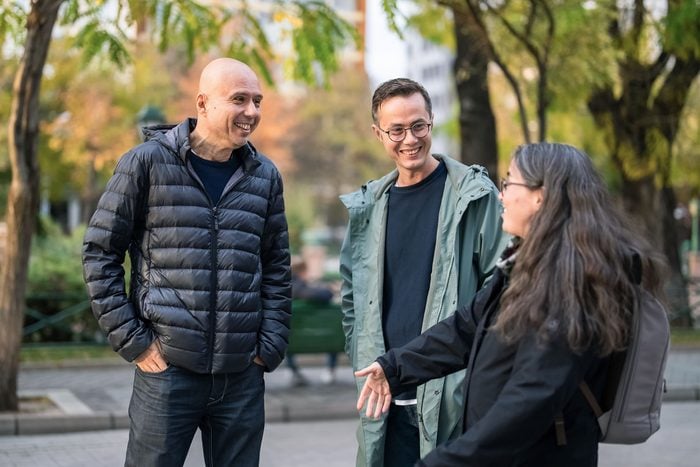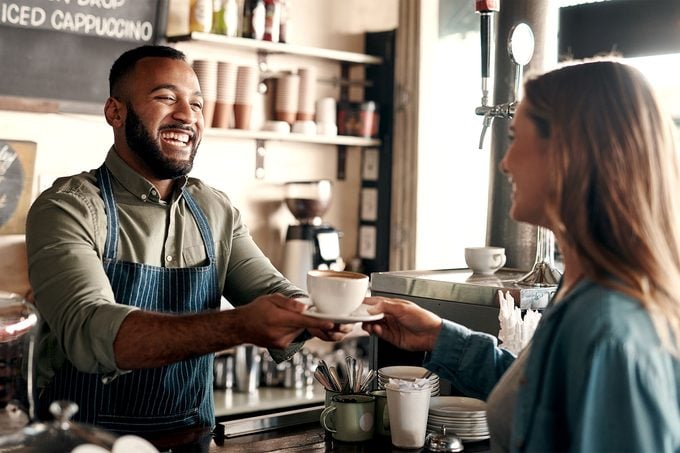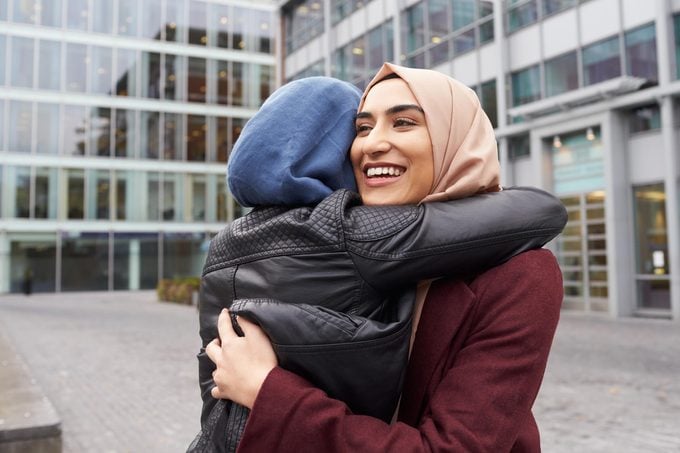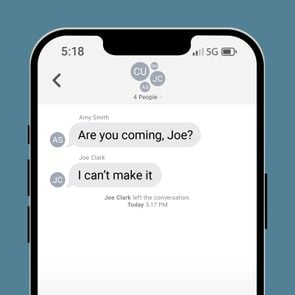14 Things Polite People Always Say
Updated: Mar. 25, 2024

Using polite words and phrases will help you turn on the charm, navigate awkward moments and defuse tension
Part of proper etiquette is knowing how to communicate with others. Like table manners, good etiquette is all about making those around you feel comfortable, and unsurprisingly, your words play a role in the process. Luckily, it’s never too late (or too early) to learn the polite words and phrases you should always use.
“It’s never too soon to begin teaching children what kind, respectful and considerate look like,” says Candace Smith, etiquette expert and founder of Etiquette for the Business of Life. “Teaching what respectful behavior looks like is key, especially as parents, caregivers and teachers model good etiquette behaviors themselves.”
If you want to practice good etiquette, especially when it comes to how you interact with others, we share expert-approved polite words below—some that are common in daily conversations, while others you might need to remember to say more often. Plus, Smith offers an exceptional tip: “Always ask yourself, ‘What’s it like to be on the other side of me?'” Keep asking that question and you’ll be one step closer to mastering good manners.
Get Reader’s Digest’s Read Up newsletter for more etiquette tips, humor, cleaning, travel, tech and fun facts all week long.
“Hello”
“Take the time to say hello, especially if you’re in an environment where you regularly see the same people,” says Jacqueline Whitmore, etiquette expert and founder of The Protocol School of Palm Beach. She explains that greeting a person makes you stand out and make a positive, lasting impact. “And even if you’re seeing an unfamiliar face, that person could be a member of the board of directors, a major donor or someone who’s important to someone in your family, and you’ve made a good impression that will stay with them,” she says.
“Please”
According to the Emily Post Institute, “please” is one of the polite words that should be used on a daily basis. Simply saying “please” changes a command into a request and therefore shows respect and regard for the person you’re speaking to. Adding one simple word can change the entire tone of the conversation.
“Thank you”

“Whether someone is going out of their way to do something they didn’t have to, like holding a door for you or performing a routine, like making your coffee, saying ‘thank you‘ is a small gesture that makes a person feel appreciated,” Whitmore says. Stopping for a moment to acknowledge another person and give them your attention is an act of kindness that speaks volumes about you.
“You’re welcome”
After being thanked, the polite response is “you’re welcome” or possibly “my pleasure”—but saying “no problem” sends the wrong message. The reason? Smith explained that replying to an expression of gratitude with “no problem” is dismissive—you’re simply saying that the gesture was easy for you. A slight shift in your response sends a much more positive message.
“Excuse me”
When you enter someone’s personal space—whether intentionally or accidentally—you should call attention to it to ask permission or offer an apology by way of saying “excuse me.” Smith also explains that “excuse me” is a helpful way to bring a conversation back into “social equilibrium” and serves as a way to get someone’s attention, provide an exit or serve as a polite transition.
The other person’s name
Whether you’re addressing a customer service representative or a CEO, using a person’s name shows courtesy and respect. According to The Social Skills Center, when someone remembers our name we feel appreciated, important and positive about our interaction. The key is to stick to the name a person uses when they introduce themselves. Don’t automatically shorten Michael to Mike, for example, unless you’re asked to do so.
“I’m happy to see you”

This only works if the sentiment is authentic, but according to Inc. Magazine, this is the most attractive sentiment you can express to another human being. The next time someone asks how you are, reply that you’re happy to see them. Hearing that their presence is causing joy for you is the most positive way to start off an interaction.
“That’s so kind of you”
“Accepting a compliment can be challenging for people,” says Sharon Schweitzer, an etiquette expert and founder of Access to Culture. “Brushing it off can indicate that you don’t value what was being complimented.” She suggests acknowledging words of praise with “that’s so kind of you.” The phrase shows gratitude and still sounds humble.
Offering condolences
“Condolences are very important, but make people uncomfortable,” Whitmore says. She suggests saying something simple, such as “I’m so sorry for your loss.” You don’t have to offer words of sympathy verbally—it’s fine to send a handwritten note, email, gift or donation to acknowledge a loss. The important thing is to let the person know you care, Whitmore stresses.
“Can you share your thoughts on …”
One of the qualities of a polite person is listening to the opinions of others. Seeking another’s thoughts on a topic shows their insights matter. And, according to Inc. Magazine, this is an invitation that makes the person experience a bit more self-worth, which generates positive feelings toward you—a win-win. Note, this only works if you are engaged in the conversation and obviously interested in the response.
“Is there anything I can do to help?”

Ignoring a person who’s struggling—to carry a package or to manage a large workload—shows a lack of empathy. When you stop and offer your assistance, the gesture goes beyond politeness and ventures into kindness. According to a study in the Journal of Social Psychology, participants who performed acts of kindness reported higher life satisfaction. So when you volunteer to step in and lighten someone’s load, literally or figuratively, you’re benefitting both of you.
“Perhaps”
Think of using “perhaps” as a way of saying “let’s agree to disagree.” According to the Collins Dictionary, “perhaps” is used as a polite reply to someone when you do not completely agree with what they have said. This polite word can be used to defuse a potential disagreement and avoid a confrontation without telling someone they’re wrong.
“I can (or cannot) attend your event”
According to Anna Post of the Emily Post Institute, it is essential to always respond to an invitation. She writes in her blog that “failure to RSVP [short for the French répondez s’il vous plaît, or “please reply”] is one of the biggest etiquette complaints I hear about and the one that is often accompanied by the most frustration.” You should always reply in a timely fashion, especially if you cannot attend an event.
“I’ve noticed how good you are at …”
The most polite people don’t monopolize conversations—they actually find ways to actively incorporate others into the fold. One way to politely spark a conversation is to point out another’s strength and ask them to talk about it. Focusing on what they’re good at puts them in a positive light, and according to Inc. Magazine, that reflects kindly on you.
About the experts
- Candace Smith is an etiquette expert and the founder of Etiquette for the Business of Life, where she offers hands-on learning in etiquette and proper communication for all aspects of life.
- Jacqueline Whitmore is an international etiquette expert and certified speaking professional. She is also the founder of The Protocol School of Palm Beach, a leading coaching and training company in the etiquette industry.
- Sharon Schweitzer, J.D., is a modern manners and international etiquette expert. She is also the founder of Access to Culture, a cross-cultural business consulting company.
Sources:
- Emily Post Etiquette: “The ‘Magic Words'”
- Candace Smith Etiquette: “When to Say ‘Excuse Me'”
- The Social Skills Center: “Why Remembering Names Leads to Greater Social Connections”
- Inc. Magazine: “17 Things Happy People Say Every Day”
- The Journal of Social Psychology: “Acts of Kindness and Acts of Novelty Affect Life Satisfaction”
- Collins Dictionary: “Perhaps”
- Emily Post Etiquette: “No Excuse Not to RSVP”
- Emily Post Etiquette: “The Continuing Importance of the RSVP”
- Inc. Magazine: “10 Genuine Ways Anyone Can Be Exceptionally Charming”



